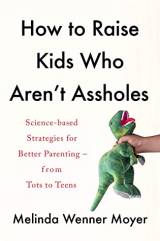How parents can nurture children’s self-esteem without raising narcissists
[ad_1]
Yet again, if you’re not the sort of dad or mum who smiles lovingly at your child though he does obnoxious issues, you likely never have a great deal to fear about with regard to narcissism. But as I’ll make clear future, moms and dads frequently do make mistakes—albeit effectively-intentioned types, ones I’ve built myself—that can have lasting consequences on kids’ self-esteem.
What today’s dad and mom get mistaken
Boosting a child is not straightforward these times. In addition to all the age-old child-rearing challenges, we also have to contend with the actuality that our children’s results feels extra elusive to us than it did to our mom and dad and grandparents (not to point out that we’ve a short while ago weathered a pandemic that has held our young children out of school). Each and every calendar year, elite colleges receive a lot more and far more applicants for the exact same number of places. At the ten most competitive US universities, the admissions price dropped by just about 60 percent among 2006 and 2018, from an ordinary of 16 per cent in 2006 to 6.4 percent in 2018 at the top fifty universities, the charge dropped by virtually 40 %. No marvel admissions scandals have been rampant.
 The troubles dad and mom deal with these days encompass a good deal far more than just university admissions. When the Organisation for Economic Co- procedure and Improvement (OECD) questioned parents in 2019 to rank their leading a few extended-phrase financial and social fears, 60 % stated that they worried that their kids would not accomplish the amount of status and consolation that they have. That’s in portion simply because children will have to receive a lot much more funds than their dad and mom did in order to manage the exact same normal of dwelling. We’re all terrified on behalf of our little ones, and for fantastic cause.
The troubles dad and mom deal with these days encompass a good deal far more than just university admissions. When the Organisation for Economic Co- procedure and Improvement (OECD) questioned parents in 2019 to rank their leading a few extended-phrase financial and social fears, 60 % stated that they worried that their kids would not accomplish the amount of status and consolation that they have. That’s in portion simply because children will have to receive a lot much more funds than their dad and mom did in order to manage the exact same normal of dwelling. We’re all terrified on behalf of our little ones, and for fantastic cause.
So it almost certainly will come as no shock to most of you that American parents—especially those people from the center- and upper- center classes—now put a ton of force on their youngsters to be excellent. It begins younger: Youngsters who haven’t however turned two are staying professionally coached for preschool interviews three-12 months-olds are getting Mandarin and coding classes to “get ahead” kindergarteners are becoming necessary to study chess fourth graders are using SAT prep courses and functioning with personal athletics coaches. There is even a countrywide chain of preschools called Crème de la Crème that teaches toddlers Mandarin, theater, and robotics in facilities that characteristic on-site STEM labs, baseball diamonds, art studios, basketball courts, and computer system labs. (Important observe: Study implies that children who go to perform-based mostly universities study just as significantly as, if not a lot more than, young ones who go to far more academically focused educational facilities.) It is no for a longer period great adequate for our youngsters to be nurtured and very well-rounded, and to appreciate discovering they now have to gain competitions, make All-American athletics groups, and get prospects in the musicals even though also, of program, getting straight As and acing the SATs.
In his 2015 reserve Our Young ones: The American Aspiration in Crisis, Harvard emeritus political scientist Robert D. Putnam explained that in the 1980s, middle- and higher-course American parents— primarily extremely educated ones—began to change their concepts about what it meant to be a good mother or father. They started shifting absent from Benjamin Spock’s “permissive parenting” solution and toward a new type of “intensive parenting,” fueled in element by the notion that small children will be much more prosperous if we force them tougher at a young age. So now, forty several years later, toddler STEM labs. Never get me improper I’m one particular of these mother and father, too. I have not enrolled my little ones in Mandarin classes, but I worry maybe far too much about no matter if they will do well and what I want to do to ensure they will. When my son provides property his report card, it’s all I can do not to examine every single quality and ponder what his inadequate marks for handwriting suggest for his potential. If level of competition is a lot fiercer than it utilized to be, how can we not experience the strain and, deliberately or not, shift some of that force on to our little ones? Who can blame us for experience fearful and seeking to do anything we can to give our young children a leg up?
Here’s the matter, nevertheless: This pressure is not good for our kids’ self-esteem. Exploration implies that when parents overemphasize achievement, young ones start off to infer that achievement defines who they are and how a great deal value they have. And in some cases, our disappointment and anger about their failures is so palpable that they truly feel like our like for them is contingent on their achievement —reinforcing the idea that their worth, and lovability, is defined by what they do, not who they are.
I’m not saying any of us outright say that we won’t really like our children if they get Cs, but young children make these inferences centered on how we act. In a study released in 2014, Harvard College Graduate Faculty of Education researchers interviewed extra than 10 thousand center and superior faculty pupils from thirty-3 faculties across the region about what they thought their mom and dad preferred most for them. Two-thirds of the students reported they considered their moms and dads would rank achievement in excess of caring for other folks. The pupils were also a few instances additional likely to concur than to disagree with the statement “My mother and father are prouder if I get excellent grades in my courses than if I’m a caring local community member in course and college.” In her reserve “Child Confidence,” psychologist Eileen Kennedy-Moore argued that balanced self-esteem is essentially the means to enable go of the question “Am I very good ample?”— and when dad and mom stress their kids to reach, they never ever give young ones the chance to end asking that issue.

Melinda Wenner Moyer is a contributing editor at Scientific American magazine and a common contributor to The New York Instances, Washington Write-up, and other countrywide magazines and newspapers. She is a school member in the Science, Well being & Environmental Reporting method at NYU’s Arthur L. Carter Journalism Institute. Her initial ebook, “How To Elevate Youngsters Who Aren’t A**holes,” was printed in July 2021 by J.P. Putnam’s Sons. You can stick to her on Twitter at @lindy2350
[ad_2]
Source connection
